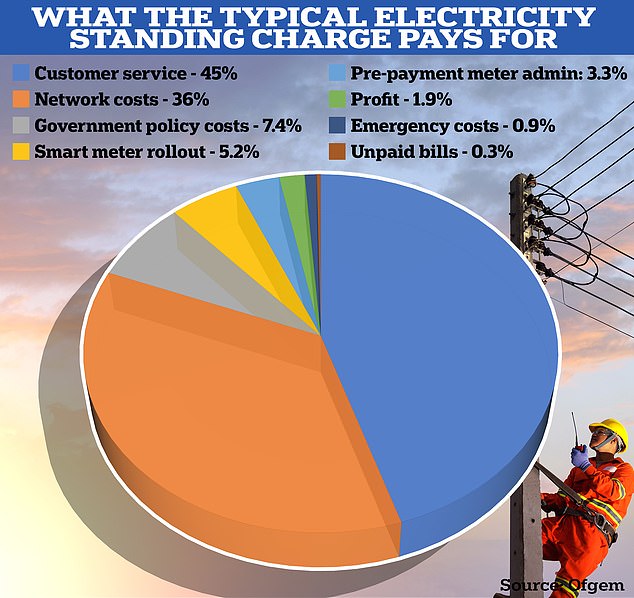The odious fixed costs of energy bills could FINALLY come down, but it could mean lower income households paying more
- Ofgem wants to change how much households pay in fixed costs
- This could mean these costs falling by £20 to £100 per year
- The costs could simply be passed on in the gas and electricity rates
Fixed costs for energy bills could finally be included under plans from regulator Ofgem, but that would mean households paying more for their gas and electricity use.
Energy bills are split into unit prices (the price for the gas and electricity used) and fixed costs (daily costs that are paid regardless of how much energy is used).
The average fixed electricity rate is now 60.12p per day and will rise to 60.99p when the new Ofgem price cap comes into effect on 1 October.
The standard rate for gas will increase from 31.41p to 31.66p.
A nice change: Ofgem wants to convert some of the costs that consumers currently pay in the form of fixed costs into unit rates. But will this put some households in a worse position?
Many households dislike fixed costs because they are unavoidable.
The impact of high unit prices can be offset by consuming less energy. However, this may mean making major concessions in electricity consumption and heating.
But now Ofgem is proposing to reduce fixed costs, cutting the part that covers the supplier’s operating costs.
For an average household, this typically amounts to around £135 a year, or 40 per cent of the usual fixed cost of £330 for households taking gas and electricity from the same supplier.
Ofgem is considering moving some of the average annual fixed costs to the unit rate of energy bills, documents published today reveal.
But this does come at a cost, as it affects people with lower incomes who do consume a lot of energy, such as the elderly, the disabled and people with large families.
Gillian Cooper, energy director at Citizens Advice, said: ‘By reducing fixed costs, some people will see a small reduction in their energy bills. However, it could also mean that households with higher electricity consumption, including low-income families, will pay more.
‘The government must urgently introduce targeted legislative proposals that meet the real energy needs of the population and protect those at risk of fixed cost reforms.’
Ofgem said: ‘Moving all business costs from fixed charges to the unit rate could have an excessively damaging financial impact on low-income, high-energy consumers.
‘It could also potentially impact the stability of energy suppliers. Based on the current allowance of around £135, we believe that moving £20 to £100 of operational costs from fixed charges to unit rates would be feasible.’
What are fixed costs paid for?
Fixed costs are used to cover various things, such as the network costs of energy companies, such as the maintenance of electricity cables.
The costs of bankrupt energy companies are also largely paid through fixed costs.
There are also other, less financially significant factors, such as government policy costs and the rollout of smart meters. The full breakdown is below:

Overview: The fixed charge for electricity covers things like customer service, the costs of managing the electricity network and operating meters.
Can fixed costs be avoided?
The only way to avoid fixed costs is to opt for an energy contract that does not have fixed costs, or for which you pay reduced rates.
These schemes are currently rare and generally charge more than average for the units of gas and electricity used.
Ofgem wants energy companies to offer such deals more often, so that there is more choice and competition.
If companies do not do it themselves, Ofgem will consider forcing them to do so.
The regulator said: ‘There are already tariffs available on the market with low or no fixed costs. However, the number of customers with low or no fixed costs has remained low over time.
‘There are no clear legal barriers for suppliers to offer fixed rates with a low or no fixed rate.
‘If energy suppliers do not increase fixed cost rates, we should consider requiring energy suppliers to offer these rates to both gas and electricity consumers.’
When do the fixed costs change?
Ofgem is currently listening to the views of energy companies, consumers and other parties on what should happen to fixed costs.
Any changes will take effect from April 2025.
